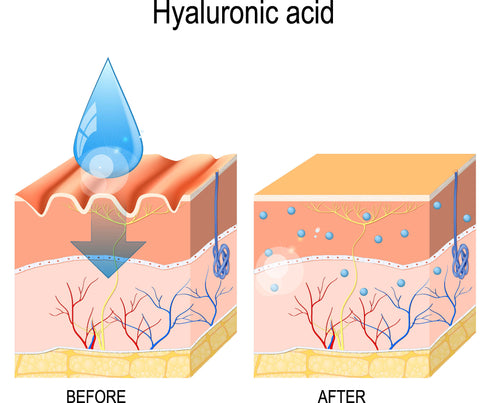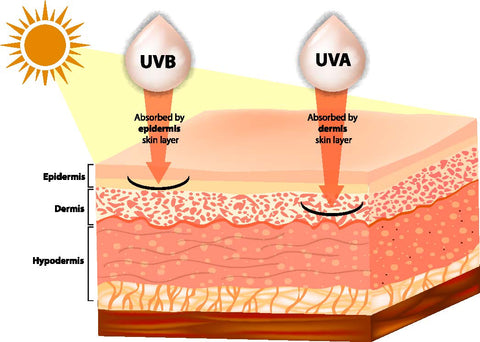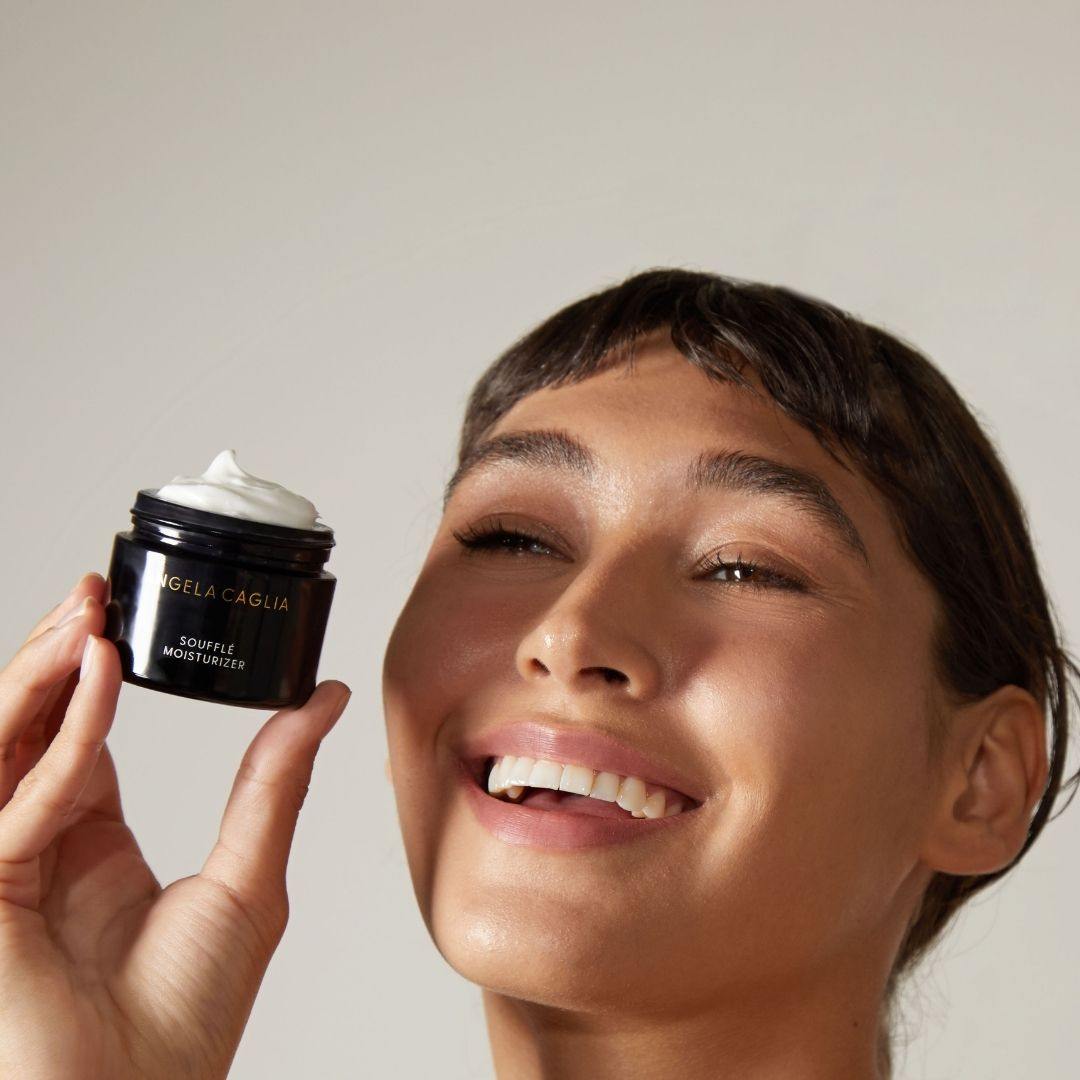
Skin Barrier: What is it and how to fix it!
Skin Barrier: What is it and How to fix it!

Here are 6 signs your skin barrier may be damaged:
1. Dryness
2. Dehydration
3. Redness/Itchiness
4. Burning Sensation
5. Worsened Acne
6. Tightness/Fine Lines
Celebrity Esthetician Angela Caglia Talks Expert Skin Barrier Advice

If you're wondering what to look out for, Celebrity Esthetician Angela Caglia explains that a damaged skin barrier often feels dry and scaly, and can be itchy or painful and rough to the touch. A damaged barrier can lead to the skin problems you normally experience, such as blemishes, redness, dryness or dehydration, oiliness, and even hypersensitivity.
Best Ingredients to Restore Skin Barrier Function Properly

Angela recommends looking for ceramide moisturizers that "will help restore skin's lipid composition" or moisturizers with Meadowfoam seed oil, like her own Souffle Moisturizer, since the oil derived from the Limnanthes Alba flower is similar in molecular structure to our own sebum so it's able to penetrate the dermis with moisture on a much deeper level.
Hyaluronic Acid

In addition to eliminating potentially irritating ingredients, Angela also advises looking for skin care ingredients such as natural oils, hyaluronic acid or glycerin in your product formulas because they also help to reduce dryness and strengthen the skin barrier. Moisturizers can certainly help establish a moisture barrier, but it's important to use ones that contain ingredients that mimic the natural lipids found in the skin.
TEWL or Trans Epidermal Water Loss
Since a damaged skin's barrier can lead to dryness and greasiness, Angela recommends finding a lightweight skin moisturizer that's soft enough to nourish the outer layers and acts as an occlusive barrier to protect the skin from trans epidermal loss. (TEWL). Maintaining a strong barrier can slow down transdermal evaporative water loss (TEWL), which can lead to skin conditions such as atopic dermatitis and eczema. A weak or damaged skin barrier is mostly dry or dehydrated and therefore unable to retain moisture, making it easier for irritants and bacteria to enter the skin.
Bad Skin Habits
The signs of a damaged barrier are varied and include redness and flaking as well as dry, tight, sensitive, and itchy skin, and tingling or burning when products are applied. Most damage to the barrier is due to the removal of its natural oils from the skin by harsh cleansers, acne medications, and acids. Make sure to check your current cleanser for ingredients such as sodium lauryl sulfate or any type of cleanser or soap can damage the skin barrier, stripping the skin of its natural sebum. The use of facial cleansers, facial scrubs, and/or excessive use of exfoliating acids can also damage the skin barrier because facial cleansers can irritate the skin and cause it to lose its natural pH level.
Sun Damaged Barrier and Excessive Exfoliation

For example, excessive sun exposure, dry weather, allergens, pollution, excessive exfoliation, and the use of harsh soaps or cleansers can also disrupt the skin barrier. Living in a dry climate or having a genetic predisposition to eczema or psoriasis can also contribute to barrier damage. Some factors that weaken the barrier, such as age, genetics, and skin conditions (eg, rosacea, acne, eczema), are largely out of your control.
Allergens
If the barrier problem is caused by an allergen that may be present on my skin, it is not expected to recur. You know your skin barrier is compromised when you notice signs of redness or inflammation, dehydration, itching, flaking, or flare-ups.
What Does Burning Skin Indicate?
If your skin burns when you apply inactive products, this is a good sign that your skin has been compromised. Even if your skin looks oily, if your barrier is compromised, it's extremely important to restore lost moisture and stay hydrated. Damaged epidermis requires hydration, so keeping your face and body hydrated is key to repairing and maintaining a healthy skin barrier.
Night Routine To Restore Skin Barrier Damage
Maintain your regular skin care regimen of mild cleansers, moisturizers, and sunscreen above to help protect and maintain skin health and prevent damage to the skin barrier. At night, gently cleanse, then hydrate with moisturizing and barrier-supporting ingredients that your skin needs.
Cell Turnover
The skin's moisture barrier is the outermost layer of the skin that helps retain water and provides protection from external aggressors such as bacteria and environmental debris. In the best skin barrier condition, the skin barrier will remove its top layer where our skin naturally exfoliates, keeping skin moisture intact and protecting allergens from getting in and causing irritation.
Bad Skin Habits
Damage to the skin barrier is often caused by unhealthy skin habits such as over-washing, using harsh products or overly alkaline cleansers, strong acne medications, over-exfoliating, and over-exfoliating your skin with products you may not even need. load. Fragrances, including essential oils, can make the skin more sensitive and can deprive the skin of its vital ingredients and ingredients that restore the skin barrier it needs to stay healthy.
Rosacea or Dermatitis
There are some things you can fix on your own (such as dryness or flaking), there are many skin conditions that will eventually require dermatological touch (and prescription products) to soothe and heal, such as rosacea or dermatitis - both of which can flash when your barrier is compromised.
As an esthetician with close to 30 years of hands-on experience with clients and their skin, Angela feels that almost every skin problem is due to a breach in the skin barrier, and that's the primary reason, in fact, why she started her own line. Sensitive skin has become an epidemic in part because of the proliferation and excess of certain ingredients and their overuse combined with environmental stressors.
Lipid-Lock™ Technology To Restore Skin Barrier Damage
Studies have shown that the most effective skincare products are that closely mimic our skin’s own lipid composition with a 1:2:1 ratio of ceramides, cholesterol and fatty acids. Treating the skin with its own naturally occurring lipids reinforces the skin’s barrier and regenerative process, enhancing its overall health and appearance.
When our skin is at peak performance, its top layer (epidermis) acts as our first level of defense—shielding us from environment aggressors like UV rays, pollution, and extreme temperatures—while maintaining its natural oils and hydration.
Skin Moisture Barrier AKA Lipid Barrier
The stratum corneum (lipid barrier) is the outer layer of the epidermis, a matrix of lipids (skin’s natural fats) and skin cells stacked like a brick and mortar wall.
While young skin has an abundance of naturally-occurring lipids, as we age lipid production declines, which can lead to dull, rough, wrinkled skin. Age isn’t the only factor—harsh exfoliating products can also disrupt the vulnerable lipid barrier.
Lipid-Lock™ Technology
Our patent-pending Lipid-Lock™ Technology protects healthy and compromised skin from TEWL (Trans-Epidermal Water Loss), and calms, plumps and hydrates the skin with nourishing essential fatty acids and free-radical fighting antioxidants that have the same molecular structure as your skin’s own sebum. You will find this cutting-edge technology in all Angela Caglia skincare.
The moral of the story: Protect your skin barrier.
Also check out our recent blog post on how to give yourself a cryotherapy facial at home.



Leave a comment
This site is protected by hCaptcha and the hCaptcha Privacy Policy and Terms of Service apply.